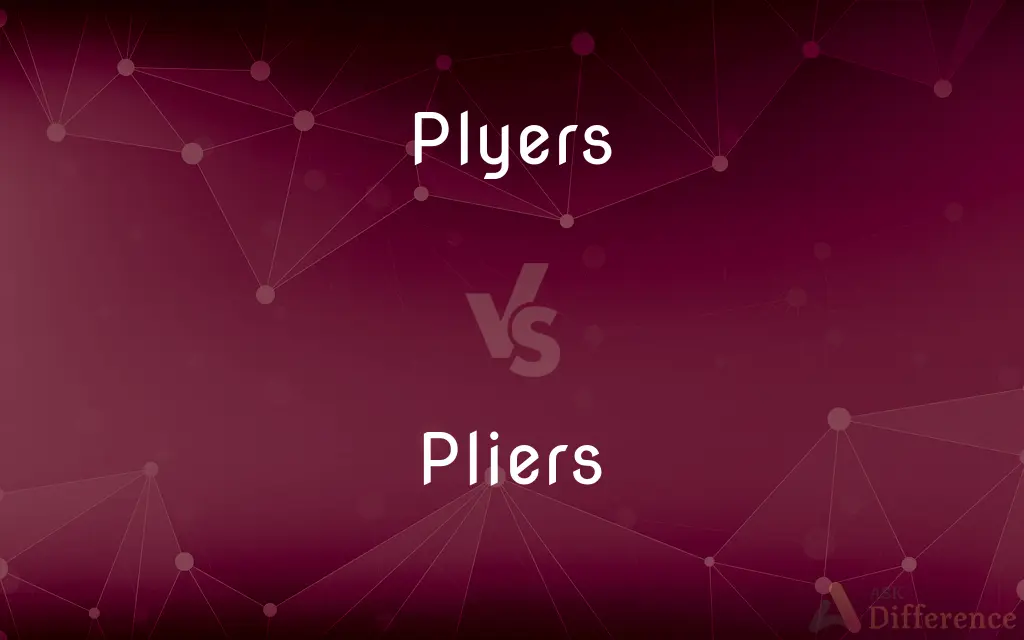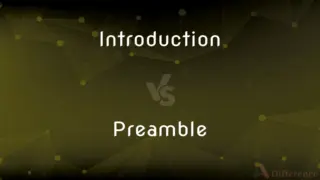Plyers vs. Pliers — What's the Difference?
Edited by Tayyaba Rehman — By Maham Liaqat — Updated on February 26, 2024
Pliers are a tool used for gripping, bending, or cutting, while "plyers" is a common misspelling of pliers and does not represent a distinct tool or concept.

Difference Between Plyers and Pliers
Table of Contents
ADVERTISEMENT
Key Differences
Pliers are a versatile hand tool designed for various tasks, including gripping, bending, and cutting materials like wire. The term "plyers" is often encountered as a misspelling of "pliers." This confusion can arise from phonetic similarities in pronunciation.
Pliers are essential in many fields, such as electrical work, plumbing, and jewelry making, offering precision and leverage when manipulating objects but it's important to note that "plyers" does not refer to a separate or distinct tool in any professional or casual context.
Pliers come in several types, such as needle-nose pliers, wire strippers, and channel locks, each tailored to specific tasks. The misspelling "plyers" does not carry any functional significance and should be corrected to "pliers" in written and spoken communication to avoid misunderstandings.
The correct identification and usage of pliers are crucial for efficiency and safety in various technical and mechanical tasks. Emphasizing the correct spelling and understanding of pliers is important for clear and accurate communication, especially in instructional or professional settings.
Both terms, when searched or discussed, often lead to the same intended subject matter pliers. However, recognizing and correcting the misspelling is important for maintaining professional standards and ensuring effective communication in technical discussions or when acquiring tools.
ADVERTISEMENT
Comparison Chart
Definition
A hand tool used for gripping, bending, or cutting.
Common misspelling of "pliers."
Usage
Essential in electrical, plumbing, and jewelry making.
Does not represent a distinct tool or concept.
Types
Needle-nose, wire strippers, channel locks, etc.
Not applicable.
Significance
Crucial for precision and leverage in various tasks.
Lacks functional significance.
Correct Spelling
Always spelled "pliers" in professional contexts.
Incorrect spelling that should be corrected.
Compare with Definitions
Plyers
Pliers A variously shaped hand tool having a pair of pivoted jaws, used for holding, bending, or cutting.
Pliers
Pliers are a hand tool used to hold objects firmly, possibly developed from tongs used to handle hot metal in Bronze Age Europe. They are also useful for bending and compressing a wide range of materials.
Plyers
One who plies a trade.
Pliers
Pincers with parallel, flat, and typically serrated surfaces, used chiefly for gripping small objects or bending wire
A pair of pliers
Plyers
Variant of plier.
Pliers
One who plies a trade.
Plyers
Plural of plyer
Pliers
Pliers A variously shaped hand tool having a pair of pivoted jaws, used for holding, bending, or cutting.
Plyers
A gripping hand tool with two hinged arms and (usually) serrated jaws
Pliers
A pincer-like gripping tool that multiplies the strength of the user's hand, often used for bending things.
I need a pair of pliers to get a good grip on that broken screw.
Pliers
A kind of small pinchers with long jaws, - used for bending or cutting metal rods or wire, for handling small objects such as the parts of a watch, etc.
Pliers
A gripping hand tool with two hinged arms and (usually) serrated jaws
Share Your Discovery

Previous Comparison
Help vs. Facilitate
Next Comparison
Introduction vs. PreambleAuthor Spotlight
Written by
Maham LiaqatEdited by
Tayyaba RehmanTayyaba Rehman is a distinguished writer, currently serving as a primary contributor to askdifference.com. As a researcher in semantics and etymology, Tayyaba's passion for the complexity of languages and their distinctions has found a perfect home on the platform. Tayyaba delves into the intricacies of language, distinguishing between commonly confused words and phrases, thereby providing clarity for readers worldwide.
















































